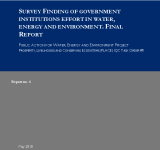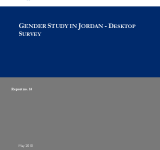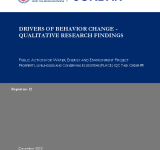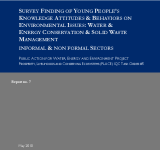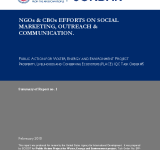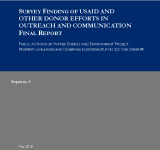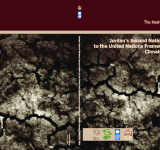The report presents the findings of the government institutions efforts survey;; which is designed for the purpose of reviewing the government agencies’ current and past communication activities in water;; energy and environment. The specific objective of this survey is to review the Donor Position Paper on Outreach targeted sample of 36 staff from 22 government institutions from Aqaba and Karak. As part of the Public Action for Water;; Energy and Environment Project (PAP);; a public education and behavior change communication program developed to support USAID’s technical and policy investments in the Jordanian water and energy sectors;; this report finds that many government institutions have more than one role;; overseeing solid waste management;; industrial water and reuse and environmental laws. The report also finds that the communications programs are scattered and credibility and trust between service agencies and their clients is a concern. The interview analysis suggests that the Public Action Project needs to focus on two or three specific areas;; and the report recommends all capacity building activities to be focused on one goal of developing;; implementing and measuring national communication strategies and action plans.
solid waste
The report presents the findings of a desktop survey conducted to review gender studies in Jordan with an overall goal of the survey as to ensure that gender is adequately addressed throughout project research;; analysis and activities of the Public Action for Water;; Energy and Environment Project (PAP). Under the PAP mandate to encourage water and energy conservation and to support behavior change towards more conservation and efficient practices both at the household level and in the commercial;; industrial and civil society arenas using social marketing behavioral methods;; the report is based on a gender desktop review of existing research on gender and natural resource management in Jordan. It capitalizes on the growing body of research on gender across sectors in Jordan including natural resource management;; to apply and adapt the findings to the PAP project activities. The report concludes with recommendations for the PAP projects such as donor collaboration;; improvement of women’s knowledge of water and energy saving methods;; engagement and creation of women’s participation to promote and support opportunities for small;; women-owned business promoting water and energy saving technologies and promotion of alternative technologies.
The report aims to understand the outlook of Jordanians;; the key determinants of behavioral change in search for “drivers” that can be used in programs promoting conservation of water or energy and reduction of solid waste. This research was conducted as part of the Public Action for Water;; Energy and Environment Project (PAP);; which aims to encourage water and energy conservation and to support behavior change towards more conservation and efficient practices both at the household level and in the commercial;; industrial and civil society arenas using social marketing behavioral methods. It is based on the qualitative research that focuses on identifying people’s motivations;; needs and desires to help formulating social marketing programs and developing adaptive capacity in individuals and groups. Some of the key questions of the qualitative research include “What are the current coping behaviors and attitudes (psychological;; social;; etc …) of the Jordanian public (disaggregated by gender;; age;; geography and income) in the face of limited water availability and high prices for energy?;; What anticipated consequences may the Government face if stricter scenarios were imposed on water and energy? The report recommends the Ministry of Education to cooperate and introduce regular classes that focus on showing youth the direct impact of water;; energy and environment on their lives and raise awareness and consciousness of children regarding their role in the environment and influence it in a positive way.
The report explores the level of knowledge;; attitudes held and practices observed by young people towards environmental issues related to water and energy conservation and sold waste management. It maps out available resources;; programs and learning opportunities in the informal and non-formal education sectors;; through which positive environmental attitudes can be encouraged and promoted. The survey of the report assess the knowledge;; attitudes and practices of young people aged 7 -24;; educations;; staff and youth workers to identify strengths and areas for improvement through capacity building and explore existing resources;; programs to evaluate their effectiveness. This research was conducted as part of the Public Action for Water;; Energy and Environment Project (PAP);; which aims to encourage water and energy conservation and to support behavior change towards more conservation and efficient practices both at the household level and in the commercial;; industrial and civil society arenas using social marketing behavioral methods. The study concludes that there is a need for more “green” programs that involve youth in a proactive way and therefore;; it recommends that programs targeting youth need to remain positive;; dynamic and in context. The recommendations of the report include development of environmental resources in the Arabic language;; the youth-led;; peer-led programs that involve participatory learning opportunities;; and social media tools to raise interests;; awareness and creation of environmental education task force.
The report is based on the findings of the survey that was designed to review NGO/CBO experience in communication/outreach and assess the capability of individual staff in the relevant NGOS and CBOs. The primary goal of the project is to institutionalize social marketing practices in NGOs and CBOs;; because organizations in the forefront of development depend on their ability to reach target groups and remove barriers to change. The research was conducted as part of the Public Action in Water;; Energy;; and Environmental Project to initiate and establish clear and identifiable behavioral changes amongst the Jordanian public and decision-makers;; to lead to increased efficiency in the use of water and energy;; and to improve solid waste handling practices. The main findings of the research identify sources of funds and grants of the NGOs;; their major activities and partnerships. The report also suggests training for successful fundraising;; social marketing and media campaigns for the NGOs and continued surveys and interviews of the NGOs.
The report is based on the outreach and communication survey of USAID and other donors' efforts. It is part of the Public Action Project;; which supports USAID's technical and policy investments in the Jordanian water and energy sectors and specific initiatives in the environment. The survey was designed to report on past;; current and planned donor efforts in relation to water;; energy and solid waste management – with the main focus on water sector. It is intended to help the PAP team to design communication strategies and specific behavior change campaigns by building on lessons learned from outreach efforts. The report is based on the survey consisting of 39 open-ended interviews with donor officials and managers of donor-funded projects;; and it includes analysis and recommendations on coordination with current and planned donor projects. The report recommends improvement in coordination through development of national communication strategies;; assistance in water and energy sectors to establish trust and credibility with their customers;; reduction and streamlining of programs targeting schoolchildren;; and setting up of priority areas for change through technical assessment in water and energy.
This report is the result of the long;; tedious and creative work of many Jordanian experts who together have reflected the most comprehensive outlook about climate change in the Jordanian context and outlined Jordan’s efforts in addressing the phenomena and the impacts of climate change. Whether in greenhouse gas inventory;; adaptation and mitigation options the readers of this report will find answers about Jordan’s minor contribution in emissions and major vulnerability to climate change impacts
